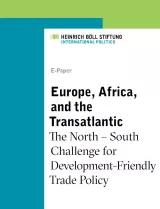Europe, Africa, and the Transatlantic
Global economic integration proceeds in regional clusters, and here we encounter paradoxical patterns. Developing countries are drawn into comprehensive trade and investment deals with the industrialised North, while remaining loosely integrated within their own regional economic communities. For twelve years, the Economic Partnership Agreements (EPA) that the European Union proposed to the African, Caribbean, Pacific (ACP) countries have been a controversial example of such comprehensive deals. As they now come to conclusion, the paper analyses their outcome in format and content. The agreements presently cover two thirds of the Sub-Saharan countries and roughly respect the African regional groups. In substance the EPAs have been limited to liberalisation of trade in goods only. These results are nevertheless critical for ACP development. The paper concludes that challenges can be mastered during implementation, and that there still is some essential policy space for national or regional agro-industrial strategies. Major risks stem from uneven implementation along North–South and South–South lines. Whether African countries arrive at a deep and rules-based integration among themselves, including the free movement of goods, services, labour, and capital, will decide about their future position in global trade, as much as development-friendly EPA implementation. In order to make regional communities and their trade agreements with the EU a success, aid for trade will have to be thoroughly revamped.
